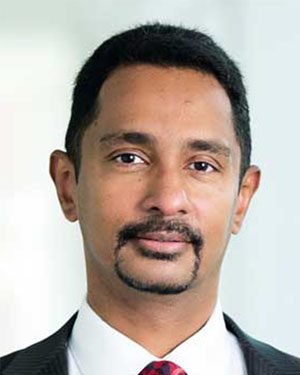Spotlights on Outreach and Engaging the Public with FOEP’s 2018 Dwight Nicholson Award Winner
 Questions and Answers with FOEP’s 2018 Nicholson awardee, Ray Jayawardhana.
Questions and Answers with FOEP’s 2018 Nicholson awardee, Ray Jayawardhana.
Ray Jayawardhana, Cornell University
Dr. Jayawardhana was awarded the Nicholson Medal for outreach "For far-reaching, multi-faceted and impactful contributions as an educator and academic leader, including authoring popular books and articles about physics for adults and children, making frequent public speaking and media appearances, developing innovative outreach programs, and founding the Science Leadership Program."
Q1. How did you get involved in doing outreach and why do you think it is important to do?
Growing up in Sri Lanka, I was active in my school’s astronomy club as well as a group called the Young Astronomers’ Association. It’s through those organizations that I got involved in organizing outreach activities. I also wrote for newspapers from a young age. As an undergraduate at Yale, I wrote for the college newspaper and the science magazine on campus. My lucky break was to get a summer internship at The Economist. After that, I was able to write for various publications during college and graduate school. As a faculty member at Michigan and later at Toronto, I enjoyed organizing a variety of outreach events and activities, including the CoolCosmos campaign that deployed 3,000 ads, with five catchy designs to pique people’s curiosity about the universe, inside Toronto’s subway cars, buses, and streetcars.
Science, at its best, is a splendid human endeavor, one that enriches us in cultural as well as material ways. So, I think it’s incumbent upon us as scientists to share not only our findings and insights, but also the adventures and challenges of the research process with the public at large.
Q2. In your experiences doing outreach, what do you find most rewarding about it and what do you find most difficult?
It is a pleasure to see someone’s eyes light up when they learn something new; it is even more rewarding if it makes them think anew about themselves or their world.
In terms of more personal rewards, as a scientist and a writer, I’ve had the chance to visit places that I could only dream of as a child: from astronomical observatories on the arid mountaintops of Chile to the steamy depths of a South African mine accompanying geochemists to collect groundwater, from the ice fields of Antarctica where we camped out for five frigid weeks gathering meteorites, to the steppes of western Mongolia to watch a total solar eclipse. A few years ago, I even got to experience the thrill of weightlessness on a parabola-hopping aircraft high above the Atlantic.
One challenge is reaching people who have a preconceived notion that science isn’t for them. That makes it difficult to open the door to engagement.
Q3. How do you find time to fit outreach in with your research?
It’s not always easy for an active researcher to find time to write for a broad audience or to engage in public outreach, but I find it incredibly rewarding. Some of our research papers tend to focus on specific—some might say narrow—albeit interesting questions. Writing for the public gives me a chance to step back a bit, consider the big picture, and pull a number of threads into a compelling story. Outreach activities also provide opportunities for creative thinking and for working together with interested colleagues.
Q4. What advice would you give to others trying to do outreach?
Try to reach beyond the usual science-interested audiences to a broader swath of the public. That’s not easy to do, and probably requires creative approaches, persistence and partnerships. It may also help to meet people where they are—physically and mentally—rather than expect them to come to your lecture, pick up your book, etc.
Responses have been adapted in part from https://gsas.harvard.edu/news/stories/qa-ray-jayawardhana and http://news.cornell.edu/stories/2018/09/ray-jayawardhana-takes-reins-arts-and-sciences
Science, at its best, is a splendid human endeavor, one that enriches us in cultural as well as material ways. So, I think it’s incumbent upon us as scientists to share not only our findings and insights, but also the adventures and challenges of the research process with the public at large.
